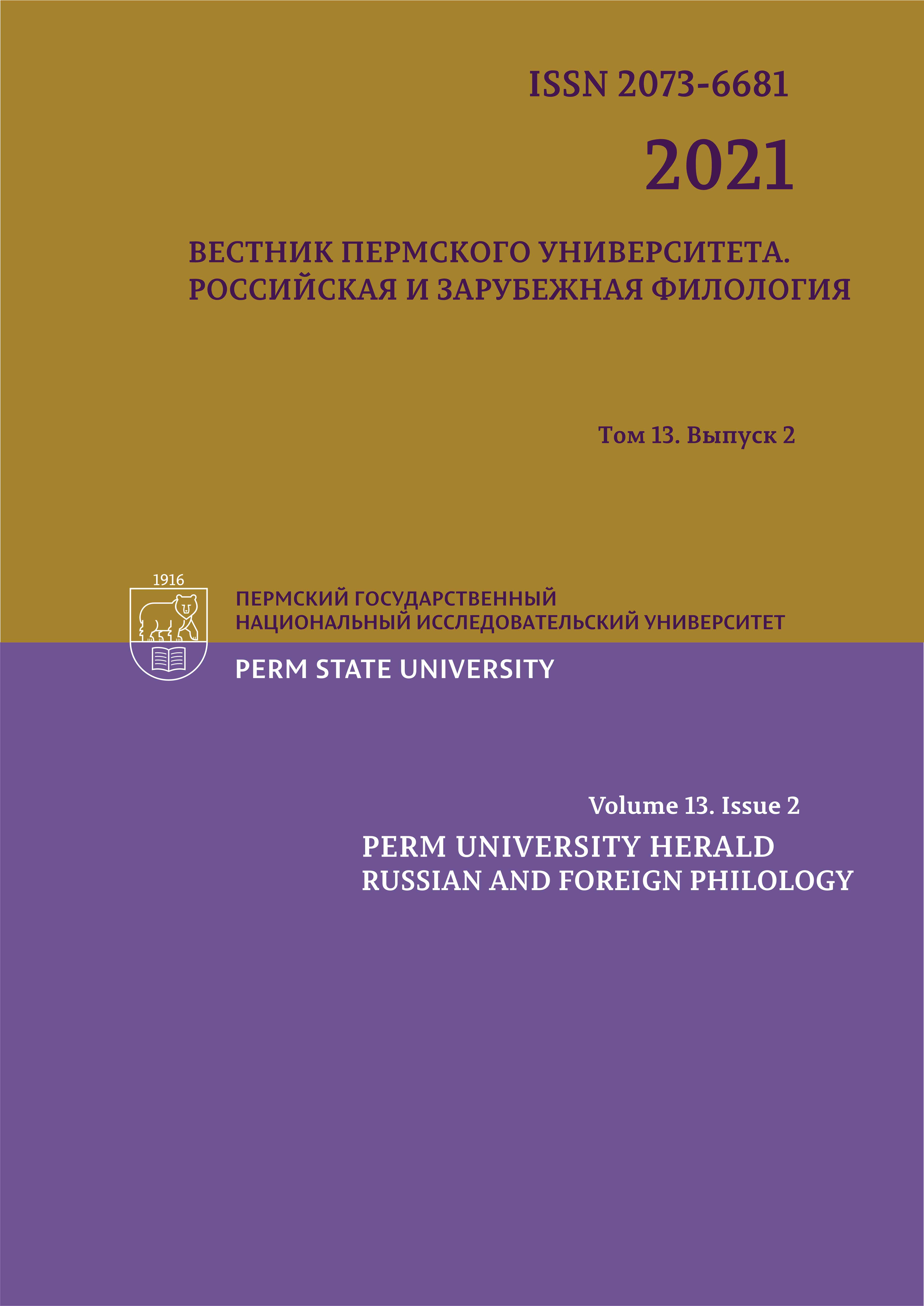КОНЦЕПТ «ЧАЙ» В ПОВЕСТИ «ЗАПИСКИ ИЗ МЕРТВОГО ДОМА» И РОМАНЕ «ПРЕСТУПЛЕНИЕ И НАКАЗАНИЕ» Ф. М. ДОСТОЕВСКОГО
DOI:
https://doi.org/10.17072/2073-6681-2021-2-81-88Ключевые слова:
Достоевский, концепт, чай, каторга, Петербургский текст, языковая картина мира.Аннотация
Статья посвящена исследованию концепта «чай» в двух произведениях Ф. М. Достоевского – повести «Записки из Мертвого дома» (1860–1861) и романе «Преступление и наказание» (1865–1866).Доказывается, что, отражая культуру русского чаепития, концепт «чай» и в романе «Преступление и наказание», и в повести «Записки из Мертвого дома» включает как традиционные репрезентации чая – «чай как элемент быта», «чай как часть трапезы», «чай как атрибут дружбы и общения», так и новые, сформированные уже самим Ф. М. Достоевским, – «чай для размышлений», «чай как лекарство и источник сил», «чай как источник духовного равновесия». Выделяется важная для психологической линии произведений репрезентация «чай как хронометр» – когда герои сверяют свои внутренние часы со временем подачи чая, а также с температурой остывающего напитка. Подробно рассматривается характерная для Достоевского репрезентация «чай как мерило достатка», получившая в обоих произведениях новое прочтение; в романе она представлена через ситуацию «угощение чаем» и через описания качества напитка, в повести – через репрезентацию «чай как роскошь».Устанавливается роль концепта «чай» в раскрытии основной авторской идеи произведений Достоевского. Наряду с другими представленными в тексте концептами, такими как «вино», «табак», «пища», «карты», чай в «Записках из Мертвого дома» позволяет противопоставить волю и каторгу, способствует трансляции мысли об абсолютной ценности свободы. Призванные воссоздать особые состояния человека – на границе света и тьмы, жизни и смерти, богатства и нищеты, репрезентации концепта «чай» в «Преступлении и наказании» во многом способствуют раскрытию душевного состояния Раскольникова, вписываются в семантику современного Ф. М. Достоевскому Петербурга.Библиографические ссылки
Список литературы
Аввакумова Н. В., Бурдин И. В. Понятие «концепт» в литературоведении // Филологические науки. Вопросы теории и практики. 2019. Т. 12, № 7. С. 97–100.
Владимирцев В. П. Петербург Достоевского (проблема локальных историко-этнографических отражений // Проблемы исторической поэтики. Вып. 1. Петрозаводск: ПГУ, 1990. С. 82–99.
Даль В. И. Толковый словарь русского языка. Современная версия. М.: Эксмо, 2000. 736 с.
Достоевский Ф. М. Собр. cоч.: в 12 т. М.: Правда, 1982. Т. 3. 463 с.
Достоевский Ф. М. Собр. cоч.: в 12 т. М.: Правда, 1982. Т. 5. 543 с.
Сафронова Е. Ю. Художественный «Кодекс» Ф. М. Достоевского: система наказаний в «Записках из Мертвого дома» // Филология и человек. 2015. Вып. 1. С. 77–89.
Фокин П. Е. Достоевский без глянца. СПб.: Амфора, 2007. 464 с.
Фокин П. Е. Достоевский глазами современников. СПб.: Амфора, 2016. 460 с.
Цзоу С. Национально-культурная специфика концепта «чай» и ее учет в обучении русскому как иностранному китайских студентов // Известия РГПУ им. Герцена. 2007. № 1. C. 437–441.
Якубович И. Д. Летопись жизни и творчества Ф. М. Достоевского. СПб.: Академический проспект, 1999. Т. 1. 540 с.
References
Avvakumova N. V., Burdin I. V. Ponyatie ‘kontsept’ v literaturovedenii [‘Concept’ notion in literary criticism]. Filologicheskie nauki. Voprosy teorii i praktiki [Philology. Theory and Practice], 2019, vol. 12, issue 7, pp. 97–100. (In Russ.)
Vladimirtsev V. P. Peterburg Dostoevskogo (problema lokal’nykh istoriko-etnograficheskikh otrazheniy) [Dostoyevsky’s Petersburg (poetics of the local historical and ethnographical reflections)]. Problemy istoricheskoy poetiki [The Problems of Historical Poetics], 1990, issue 1, pp. 82–89. (In Russ.)
Dal V. I. Tolkovyy slovar’ russkogo yazyka. Sovremennaya versiya. [Explanatory Dictionary of the Russian Language. Contemporary edition]. Мoscow, Eksmo Publ., 2000. 736 p. (In Russ.)
Dostoyevsky F. M. Sobr. soch.: v 12 t. [Collected Works in 12 vols.]. Moscow, Pravda Publ., 1982, vol. 3. 463 p. (In Russ.)
Dostoyevsky F. M. Sobr. soch.: v 12 t. [Collected Works in 12 vols.]. Moscow, Pravda Publ., 1982, vol. 5. 543 p. (In Russ.)
Safronova E. Yu. Khudozhestvennyy ‘kodeks’ F. M. Dostoevskogo: Sistema nakazaniy v ‘Zapiskakh iz mertvogo domaʼ [F. M. Dostoyevsky’s art ‘code’: System of penalties in ʽNotes from a dead houseʼ]. Filologiya i chelovek [The Philology and a Person Academic Journal], 2015, issue 1, pp. 77–89. (In Russ.)
Fokin P. E. Dostoevskiy bez glyantsa [Unvarnished Dostoyevsky]. St. Petersburg, Amfora Publ., 2007. 464 p. (In Russ.)
Fokin P. E. Dostoevskiy glazami sovremennikov [Dostoyevsky through the eyes of contemporaries]. St. Petersburg, Amfora Publ., 2016. 460 p. (In Russ.)
Tsou S. Natsional’no-kul’turnaya spetsifika kontsepta ‘chay’ i ee uchet v obuchenii russkomu yazyku kak inostrannomu kitayskikh studentov [National and cultural peculiarities of the concept ‘tea’ and how they are taken into account in teaching Russian to Chinese students]. Izvestiya RGPU im. Gertsina [Izvestia: Herzen University Journal of Humanities & Sciences], 2007, issue 1, pp. 437–441. (In Russ.)
Yakubovich I. D. Letopis’ zhizni i tvorchestva F. M. Dostoevskogo [The Chronicles of Life and Works of Dostoevsky]. St. Petersburg, Akademicheskiy Prospect Publ., 1999, vol. 1. 540 p. (In Russ.)




